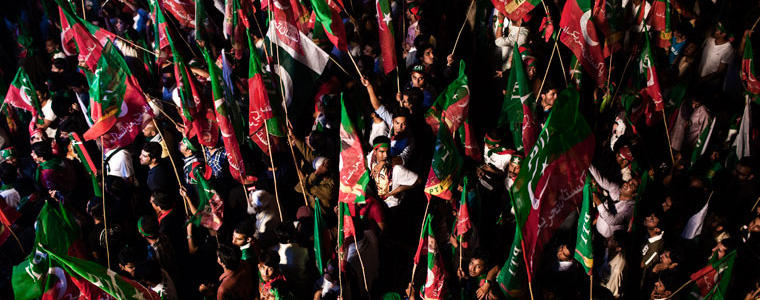What do Pakistan’s Vigorous Campaigns and Electoral Violence Mean for Unity Afterwards?
USIP’s Nadia Naviwala highlights the mood among the parties and the public on the eve of the May 11 vote.

On the day before elections in Pakistan, it’s hard to tell what Pakistan’s near-term future will look like.
Tehrik-i-Taliban Pakistan (TTP) violence has turned the elections into a battle for the soul of the state. Relatively secular parties, which supported security operations against the Taliban while in power over the past five years, are seeing their candidates killed and rallies and offices attacked. This has boosted the odds for parties that favor negotiations and peaceful engagement with the TTP, including the party of cricketer-turned-politician Imran Khan. How the next government will deal with growing militancy and violence is entirely unclear.
But as a heated campaign season comes to an end, one point has been missed: all political parties agree that Pakistan desperately needs governance. Pakistan needs energy, education, jobs, and justice.
To say Pakistanis are frustrated would be a gross understatement. Pakistanis have had it. A new opinion poll by the U.S.-based Pew Research Center’s Global Attitudes Project found that 90 percent of Pakistanis believe their country is on the wrong track, and 80 percent say the economy is in poor condition. Concerns about Taliban violence also are increasing, according to the survey, conducted March 11-31 using face-to-face interviews with a sample covering about 82 percent of the country’s adult population.
“For the first time since the Pew Research Center began polling on these issues, the Taliban is essentially considered as big a threat to Pakistan as longtime rival India,” Pew reported on its website.
Imran Khan has most effectively campaigned on slogans of “Change” and a “New Pakistan,” his promises in stark contrast to an outgoing government that many voters criticize for nonperformance and holding onto power through its powerful patronage networks. Khan faces his toughest fight in Punjab, where supporters of Nawaz Sharif say his PML(N) party, which controlled the Punjab Provincial Assembly for the past five years, has delivered infrastructure and governed more effectively than any other in the country. Even religious parties promise justice and prosperity through sharia law.
With the parties vying energetically for voters, candidates are naturally more focused on the differences among them and reluctant to acknowledge what their messages have in common – that Pakistan needs to reverse course to emerge from crisis and move toward aman, khushali, bijli (peace, prosperity, electricity).
After the elections, the parties will try to form a coalition that can govern. The result might be a weak coalition, constantly obstructed by the opposition. Or the results could lead to an impasse, with no one able to form any governing coalition at all. As Nawaz Sharif told Dawn reporter Cyril Almeida in an interview on May 9, that would mean the next five years in Pakistan will be worse than the last five.
The voter turnout in this election is expected to be higher than any other in Pakistan’s history. The excitement is as palpable as the uncertainty. Elections represent hope for the Pakistani people, and the parties are full of promises.
But once elections are past, pulling the state out of crisis will require cooperation to displace competition in an unprecedented way. In a state where a disproportionate share of resources are distributed as patronage based on political lines, political cooperation is the first step toward serving the public interest.
Can all parties sit together, despite their differences, figure out where they agree, how to get there, and doggedly focus on it? The shared territory and initial wins would be small, but the process will set a precedent. Rather than dramatic promises, a sincere and meaningful agreement on shared priorities – and on the sacrifices that will need to be made to get there – is what Pakistan will need after elections.
Join us on May 14 for a discussion on the electoral results with USIP’s Andrew Wilder, Moeed Yusuf and other experts.
Nadia Naviwala is USIP’s country representative in Pakistan.



